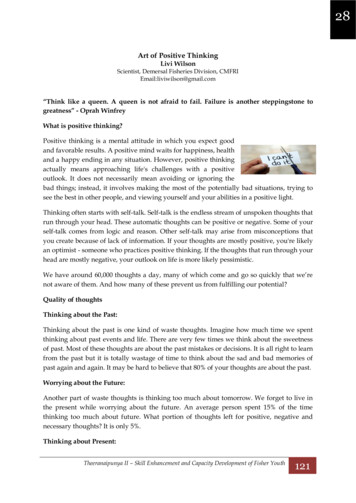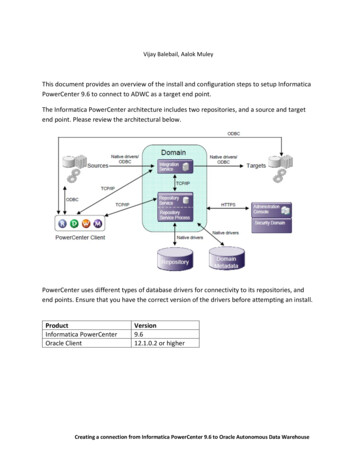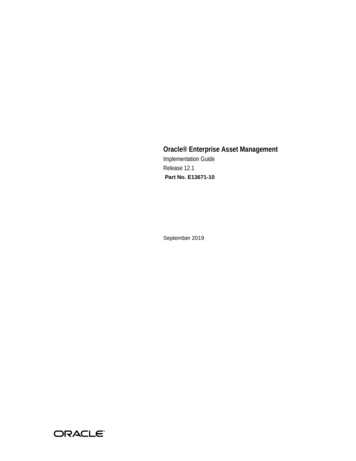
Transcription
28Art of Positive ThinkingLivi WilsonScientist, Demersal Fisheries Division, CMFRIEmail:liviwilson@gmail.com“Think like a queen. A queen is not afraid to fail. Failure is another steppingstone togreatness” - Oprah WinfreyWhat is positive thinking?Positive thinking is a mental attitude in which you expect goodand favorable results. A positive mind waits for happiness, healthand a happy ending in any situation. However, positive thinkingactually means approaching life's challenges with a positiveoutlook. It does not necessarily mean avoiding or ignoring thebad things; instead, it involves making the most of the potentially bad situations, trying tosee the best in other people, and viewing yourself and your abilities in a positive light.Thinking often starts with self-talk. Self-talk is the endless stream of unspoken thoughts thatrun through your head. These automatic thoughts can be positive or negative. Some of yourself-talk comes from logic and reason. Other self-talk may arise from misconceptions thatyou create because of lack of information. If your thoughts are mostly positive, you're likelyan optimist - someone who practices positive thinking. If the thoughts that run through yourhead are mostly negative, your outlook on life is more likely pessimistic.We have around 60,000 thoughts a day, many of which come and go so quickly that we’renot aware of them. And how many of these prevent us from fulfilling our potential?Quality of thoughtsThinking about the Past:Thinking about the past is one kind of waste thoughts. Imagine how much time we spentthinking about past events and life. There are very few times we think about the sweetnessof past. Most of these thoughts are about the past mistakes or decisions. It is all right to learnfrom the past but it is totally wastage of time to think about the sad and bad memories ofpast again and again. It may be hard to believe that 80% of your thoughts are about the past.Worrying about the Future:Another part of waste thoughts is thinking too much about tomorrow. We forget to live inthe present while worrying about the future. An average person spent 15% of the timethinking too much about future. What portion of thoughts left for positive, negative andnecessary thoughts? It is only 5%.Thinking about Present:Theeranaipunya II – Skill Enhancement and Capacity Development of Fisher Youth121
Livi WilsonOnly 5% of our thoughts are about the present. Let us divide these thoughts into Positive,Negative and Necessary. What do you think that how much of these thoughts are positive?It is just 1 or 2%. This is the volume of positive thinking of the average human being.This is the quality of our thoughts and our life. You know very well that our happiness,peace and love purely depend on the positive thoughts. Therefore, it is important to havehealthy thoughts in our mind. Positive thoughts: These are thoughts related to peace, affirmations, happiness, loveand purity.Negative thoughts: Feelings related to ego, anger, grudge and fear comes intoNegative thoughts.Necessary thoughts: Thoughts related to daily activities and planning comes intonecessary thoughts.Waste thoughts: Even if we have no power on circumstances, we still keep thinkingabout them. Thoughts about these situations are called waste thoughts.“Positive thinking will let you do everything better than negative thinking will.”- ZigZiglarReframing your thinkingExample 1: Girl getting dressed for a party“I’m too fat, I won’t know what to say, and I won’t fit in”.Reframe: I’ll have fun; I look fine, and my friends like me the way I am.Example 2: “This assignment is too big; I’ll never get it finished”.Reframe: “If I relax and focus, break down the assignment into smaller bits and manage mytime well, I’ll finish by the deadline”;Example 3: “I’ve never done something this big before, what if I can’t do it”?122Talk to yourself like you would to someone you love
Art of Positive ThinkingReframe: “I love a challenge. This assignment is simply a bigger version of my pastsuccesses it’s time to step up”.Example 4: “I’ve bombed the exam and now I’m going to fail this subject”.Reframe: “It’s too early to tell yet, maybe I did better than I expected, let’s wait and see”Example 5: “You are an idiot!”Reframe: “Don’t worry, its ok. Let’s be careful next time”.Example 6: “You are a looser!”Reframe: “You didn’t make it this time but next time we will try again.”Remember: In reframing, we are not changing the situation or neglecting responsibility for amistake but we change the way we look at ourselves and therefore have access to moresupportive ways to deal with the situation. Give it a go!Practice these simple exercises and suggestions to keep your thoughts on the positive side. Only use positive words while talking. If you’re constantly telling yourself “I can’t”you may convince yourself that’s the truth. Replace these negative words withpositive ones instead. Tell yourself you will do your best or that you will try yourhardest instead.Direct your thoughts. This technique, used by psychotherapists, can help you tocontrol your thoughts when you start to feel down or anxious. Create a happythought, a positive image, or give yourself positive feedback to keep bad feelings incheck.Believe you will succeed. There is nothing like believing in yourself to create asuccessful reality. Give yourself the benefit of the doubt and believe that you willsucceed in fulfilling your goals.Analyze what went wrong. Thinking positively doesn’t mean denying that there isanything wrong. Instead, give yourself some time to think about the things that ledup to your current situation so you can avoid future mistakes and look toward amore positive tomorrow.Give yourself credit. Often when we feelfrustrated or upset we only concentrate onthe bad things or the mistakes we’ve madeinstead of giving ourselves credit for whatwe do right. Allow yourself to feelconfident about the things you haveaccomplished, even if you’ve messed up inother areas.Forgive yourself. Constantly beatingyourself up about things that have gone wrong won’t change them. Tell yourself thatyou’re forgiven for your mistakes and allow yourself to move on.Theeranaipunya II – Skill Enhancement and Capacity Development of Fisher Youth123
Livi Wilson Learn from the past. The past is behind you and no matter how badly things wentthere is nothing you can do to change them. Whenever you feel negative thoughtsabout the past come up, replace them with positive thoughts about the future.Remember things could be worse. No matter how bad things get to, remember thatthey could be worse and be grateful for all the good things that are in your life, evenwhen it seems there’s more bad than good.Look for opportunity. In every failure, there’s an opportunity to improve. Spendtime thinking of ways you can turn your setbacks at work into ways you can getahead in the future.Stop making excuses. There are always a million excuses for any person not to dosomething even if that something can make them feel happier. Stop putting upobstacles to your happiness and ditch those lame excuses when you hear yourselfmaking them.Don’t play the victim. Bad things happen to everyone from time to time. Pityingyourself and wanting others to feel sorry for you isn’t going to make things better.Pick yourself up and start working towards a happier future.Associate yourself with those who think positively. Positivity is contagious, so findfriends and family members who look on the bright side to surround yourself with.Come up with ideas of how to turn negative thoughts into positive ones. If youfind yourself thinking you should have done this or that differently, try changingyour thoughts around. Instead give yourself credit for what you did. Do rememberthat you are not perfect or that you can do better next time.Visualize a successful outcome. Sometimes it can be helpful to picture yourselfcompleting a project successfully or getting the promotion you desire. This canencourage you and make you feel better about the situation.Think of ways to turn visualization into action. The next natural step of this is tothink of just how you’re going to get to where you see yourself. Just picturing it isn’tgoing to make it happen, so create a plan to take it one step at a time until you’vemade it.Take control of your decisions. You’re the boss of what is going on in your life, evenwhen you feel like you don’t have a choice. Take back control of your decisions andmake the choice to be happier and more positive.Smile. Sometimes all it takes to feel good is to put a smile on your face.Difference between positive & negative thinking124Positive thinkingThey are winnersAlways has a programNegative thinkingThey are losersAlways has an excuseSays “ let me do it for u”Says “ that is not my job”Sees an answer for every problemSees a problem for every answerTalk to yourself like you would to someone you love
Art of Positive ThinkingStand firm on values but compromise onpetty thingsSays “it may be difficult but it ispossible”Stand firm on petty things butcompromise on valuesSays “It may be possible but it is toodifficult”Makes a mistake & says “I was wrong”Makes a mistake & says “ it wasn’t myfault”Are apart from the teamSee the painSee problemsBelieve for them to win someone has tolosePlan but no preparationAre a part of the teamSee the gainSee possibilitiesBelieve in win/ winsPlan & prepare to winThe health benefits of positive thinkingResearchers continue to explore the effects of positive thinking and optimism on health.Health benefits that positive thinking may provide include: Increased life spanLower rates of depressionLower levels of distressGreater resistance to the common coldBetter psychological and physical well-beingReduced risk of death from cardiovascular diseaseBetter coping skills during hardships and times of stress“Your beliefs become your thoughts,Your thoughts become your words,Your words become your actions,Your actions become your habits,Your habits become your values,Your values become your destiny.”― Mahatma GandhiTheeranaipunya II – Skill Enhancement and Capacity Development of Fisher Youth125
What is positive thinking? Positive thinking is a mental attitude in which you expect good and favorable results. A positive mind waits for happiness, health and a happy ending in any situation. However, positive thinking actually means approaching life's challenges with a positive outlo










